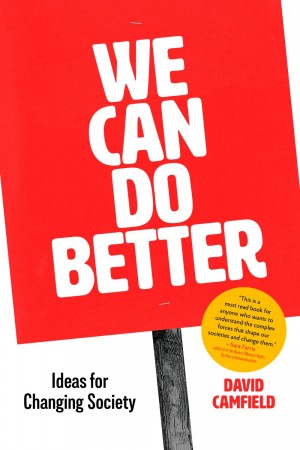
Not many leftists need convincing that Biden is uninspiring; but you can’t effectively fight this year’s lesser evil with some misty vision of a better political alternative in some indefinite future.
PETER DRUCKER is a longtime socialist and gay activist, an advisory editor of Against the Current, and editor of the anthology Different Rainbows on same-sex sexualities and politics in the dependent world. He lives in Rotterdam, the Netherlands. Many thanks to Alan Sears and Christopher Beck for comments on an earlier version of this piece.

Not many leftists need convincing that Biden is uninspiring; but you can’t effectively fight this year’s lesser evil with some misty vision of a better political alternative in some indefinite future.

David Camfield. We Can Do Better: Ideas for Changing Society. Halifax & Winnipeg: Fernwood Publishing, 2017. 168 pp.
The breathtakingly rapid changes in the capitalist world around us has left basic political education by the revolutionary left trailing behind.

In the summer of 1994, my partner and I happened to be on vacation in Stockholm for the Pride celebration, so we joined in. I remember it as a rather modest, subdued affair compared to the ebullient marches I remembered from New York and San Francisco. But what struck me most was the lesbian/gay federation’s emphasis on legal recognition for same-sex partnerships, at a time when Sweden banned sex in gay bathhouses. I thought these were upside-down priorities. Swedish same-sex couples would win in fact the right to register for partnership benefits in 1995, while the ban on bathhouse sex stayed on the books until 2004. What a curious country this is, I remember thinking.
In the mostly forgotten history of early twentieth-century movements for sexual freedom, Magnus Hirschfeld’s name is one of the most familiar—and one of the most contested. As a Jewish scientist who championed sexual deviants, he made a perfect target for the Nazis, who were tragically successful in extirpating much of his life’s work.
For most Jews in the United States, the legacy of the Soviet Union is linked to anti-Semitism. This is understandable, given not only the targeting of Jewish writers, doctors, and others by Stalin’s terror but also the quotas and petty persecution of the Khrushchev and Brezhnev years. Some people remember that the Russian Revolution freed Jews from the pogroms and segregation of czarism. But few have any conception of the extraordinary flourishing of Yiddish-language culture under the Bolsheviks in the 1920s.
The economic crisis and the rise of Occupy have given fresh urgency to the question: is there an alternative to capitalism? And if so, what? For almost a century now the failure of the Russian Revolution has provided capitalism’s defenders with a boogeyman, an argument that any attempt to get rid of the existing system will lead to something even worse.
As Stephen Steinberg says, "There is nothing progressive about flooding the lower echelons of the labor market with desperate immigrants who depress wages . . . It is also problematic when the nation imports workers to fill higher echelons of the job pyramid. . . ." Progressives should support elements of his policy agenda such as vigorously enforcing anti-discrimination laws, expanding affirmative action and creating a job corps for minority youth.
AS SEVERAL OF THE PARTICIPANTS in Part I of this symposium noted, the association between lesbians, gays, and the left was a constant through much of the 20th century. It is an open question whether that connection will amount to much in the 21st century. As in many countries, there is a push in the United States today to incorporate lesbians and gays into the prevailing sexual and familial order. Given how that order is structured under capitalism, probably the best it can offer us is second-class citizenship.